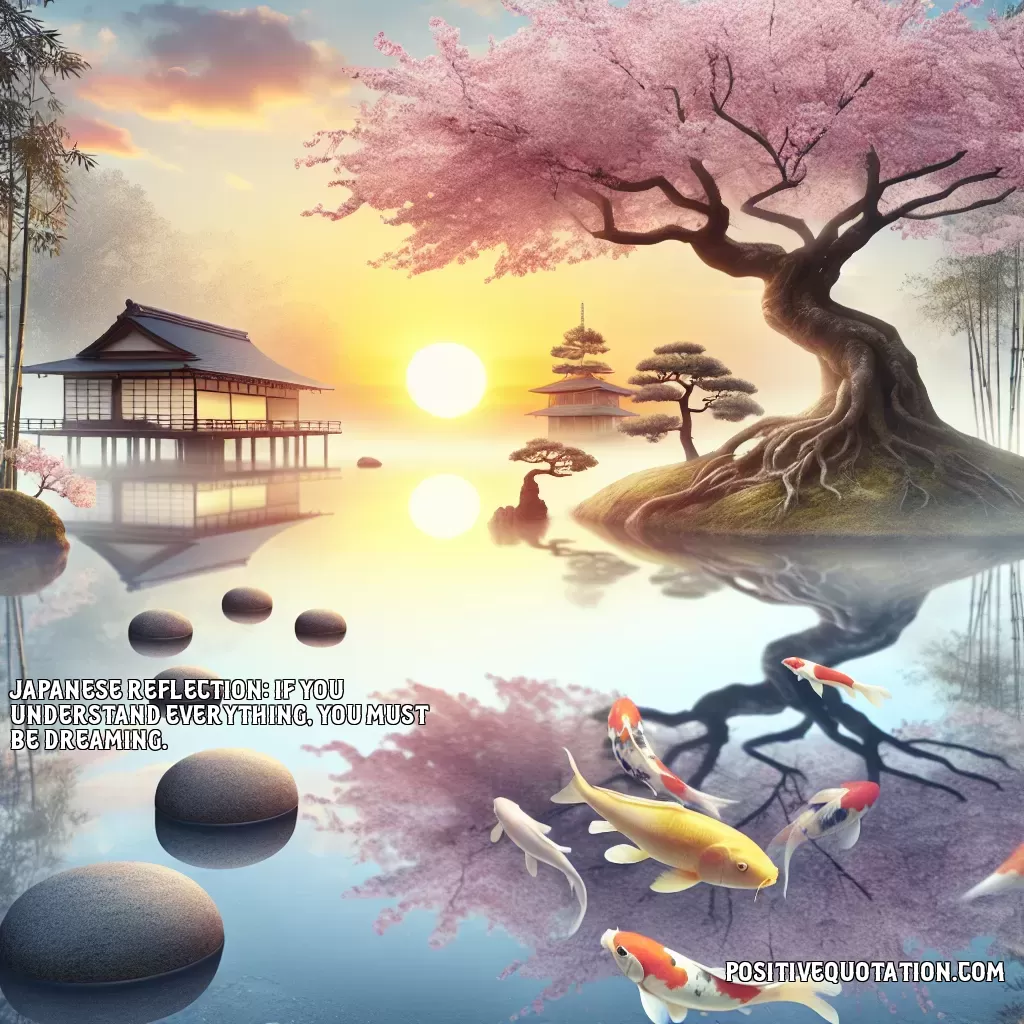
Japanese Reflection: If you understand everything, you must be dreaming.
Author: Natsume Sōseki
👁️ 6 views

Japanese Reflection: If you understand everything, you must be dreaming.
👁️ 6 views
The Japanese reflection, "If you understand everything, you must be dreaming," captures a profound insight into the nature of knowledge and human understanding. At its core, this quote suggests that the quest for complete understanding of our world is inherently elusive. It implies that the complexity of life and its myriad aspects are beyond the full comprehension of any single individual. To truly understand everything would be an overwhelming, unreachable state that is more akin to the illusory experiences found in dreams than to reality. This reflection acknowledges the limits of human cognition and the vastness of the unknown. It suggests that claiming to understand everything reveals a lack of awareness of life's inherent complexity. The world is full of paradoxes, uncertainties, and infinite variables, making total understanding not only impractical but also impossible within the constraints of human experience. Furthermore, this quote can be seen as a reminder to embrace the mystery and ambiguity of life. Accepting that not everything can be understood allows individuals to remain open-minded, curious, and humble in their pursuit of knowledge. Rather than being discouraging, the acknowledgment of our limitations can enhance our appreciation for the beauty and mystery of the universe. In a practical sense, this reflection encourages continuous learning and inquiry, advocating for a growth mindset where questions are valued more than definitive answers, fostering a deeper exploration of the unknown. Embracing the idea that we cannot understand everything can liberate us from the pressure to seek absolute certainty, inviting us instead to enjoy the journey of exploration and discovery.
Quote By: Natsume Sōseki
Natsume Sōseki, born on February 9, 1867, in Ushigome, now part of Tokyo, Japan, is one of Japan’s most celebrated novelists and a central figure in modern Japanese literature. His real name was Natsume Kinnosuke, and he came from a samurai family that faced financial difficulties during his childhood. This background influenced his perspectives on society, class, and the human condition, elements that would later thread through his literary works.
Sōseki’s academic journey began at the University of Tokyo, where he studied English literature. His passion for literature led him to become a lecturer in English, but it was his experience studying in England that deeply shaped his worldview. The period of isolation and culture shock during his time abroad sparked the themes of alienation and disconnection found in many of Sōseki's writings. Upon returning to Japan, Sōseki began to write extensively, and his first major novel, "Wagahai wa Neko de Aru" (I Am a Cat), published in 1905, was met with critical acclaim. In this satirical work, Sōseki gives voice to a nameless cat who observes human behaviors, critiquing the superficiality of society.
Throughout his career, Natsume Sōseki produced a series of influential works, including "Botchan," "Kusamakura," and "Sorekara," each exploring the intricacies of human relationships and the existential dilemmas of life during a time of rapid modernization in Japan. His writing style is characterized by its psychological depth and rich prose, which allows readers to engage profoundly with his characters’ inner lives.
Natsume Sōseki’s legacy extends beyond literature; he is regarded as a bridge between traditional Japanese aesthetics and Western literary influences. His influence is evident in contemporary Japanese literature, and he is often considered a national literary treasure. Sōseki passed away on September 29, 1916, but his works continue to resonate with audiences today, reflecting the complexities of human nature and the social conditions of his time. His enduring relevance ensures that Natsume Sōseki remains a vital figure in understanding Japan's literary heritage.